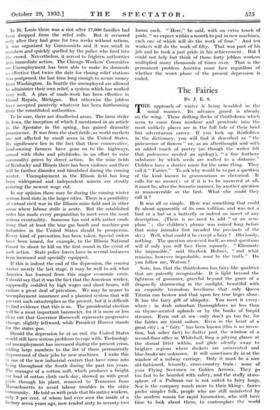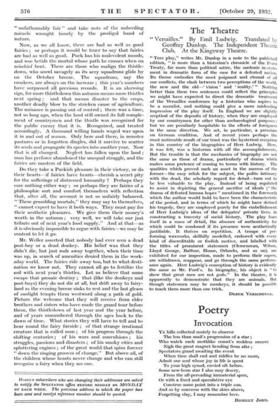The Fairies
BY J. E. S. THE approach of winter is being heralded in the usual manner. Its advance guard is already on the wing. Those drifting flecks of thistledown which seem to come from nowhere and penetrate into the most unlikely places are in the full tide of their brief but adventurous career. If you look up thistledown in the dictionary, you will find it described as " the pubescence of flowers " or, as an afterthought and with an added touch of poetry (as though the writer felt that pubescence needed an apology), " a fine feathery substance by which seeds are wafted to a distance." Children have a shorter name for the same thing. They call it " Fairies." To ask why would be to put a question of the kind known to grammarians as rhetorical. It calls for no answer ; or if it is to be answered at all, it must be, after the Socratic manner, by another question as unanswerable as the first. What else could they call it ?
It was all so simple. Here was something that could fly about apparently of its own volition, and was not a bird or a bat or a butterfly or indeed an insect of any description. (There is no need to add " or an aero- plane " ; the children's phrase was coined long before that noisy intruder first invaded the precincts of the sky.) Well, what could it be except a fairy ? Obviously, nothing. The question answered itself, as most questions will if only you will face them squarely. " Eliminate the impossible," said Sherlock Holmes, " and what remains, however improbable, must be the truth." Do you follow me, Watson ?
Note, too, that the thistledown has fairy-like qualities that are patently recognizable. It is light beyond the lightness of gossamer, graceful beyond the grace of a dragon-fly shimmering in the sunlight, beautiful with an exquisite tremulous loveliness that only Queen Titania can bestow and that upon her true lieges alone. It has the fairy gift of ubiquity. You meet it every- where : in drab suburban thoroughfares no less than on thyme-scented uplands or by the banks of limpid streams. Even out at sea—only don't go too far, for the fairies are timid sailors. Even in the heart of a great city ; a " fairy " has been known (this is no inven- tion, but sober fact) to flutter past the window of a second-floor office in Whitehall, fling a pitying glance at the dismal litter within, and glide silently away to brighter regions where dockets are uninvented and blue-books are unknown. It will sometimes fly in at the window of a railway carriage. Only it must be a nice old-fashioned, leisurely, cross-country train : none of your Flying Scotsmen or Golden Arrows. They go too fast to be boarded with safety, and the stuffy atmo- sphere of a Pullman - car is not suited to fairy lungs. Nor is the company much more to their liking : fairies prefer simpler folk, people who are still uninfected by the modern mania for rapid locomotion, who still have time to look about them, to contemplate the world " unfathomably fair "- and take note of the unheeding miracle wrought hourly by the prodigal hand of nature.
Now, as we all know, there are bad as well as good fairies ; or perhaps it would be truer to say that fairies are bad as well as good. Puck has his malevolent moods, and woe betide the mortal whose path he crosses when on mischief bent. There are those who malign the thistle- down, who scowl savagely as its aery squadrons glide by on the October breeze. The squadrons, say the croakers, are always on the increase ; this year's numbers have surpassed all previous recordS. It is an alarming sign, for more thistledown this autumn means more thistles next spring ; and that means disaster to the crops, another deadly blow to the stricken cause of agriculture. The nuisance is passing out of control ; there was a time, not so long ago, when the land still owned its full comple- ment of countrymen and the thistle was recognized for the public enemy that it is. Recognized, and treated accordingly. A thousand willing hands waged war upon it in and out of season. Only here and there, in remoter pastures or in forgotten dingles, did it survive to scatter its seeds and propagate its species into another year. Now that is all changed. Neglect has fallen upon the land ; man has perforce abandoned the unequal struggle, and the fairies are masters of the field.
Do they take a Puckish pleasure in their victory, or do their hearts—if fairies have hearts—cherish a secret pity for the sufferings of distressed humanity ? Perhaps they care nothing either way ; or perhaps they are fairies of a philosophic sort and comfort themselves with reflection that, after all, the account is not so unfairly balanced. " These grumbling mortals," they may say to themselves, " cannot expect to have it both ways. They must pay for their aesthetic pleasures. We give them their money's worth in the autumn ; very well, we will take our just tribute out of next year's food supply." And at that—as it is obviously impossible to argue with fairies—we may be content to let it go.
Mr. Weller asserted that nobody had ever seen a dead post-boy or a dead donkey. His belief was that they didn't die, but just rode away together, when their time was up, in search of amenities denied them in the work- aday world. The fairies ride away too, but to what desti- nation we know not. They cannot all go to fertilize the soil with next year's thistles. Let us believe that some . escape that prosaic destiny ; that (like the donkeys and post-boys) they do not die at all, but drift away to fairy- land as the evening breeze sinks to rest and the last gleam of sunlight tempts them westward along a path of gold. Picture the welcome that they will receive from elder brothers and sisters who have made the grand tour before them, the thistledown of last year and the year before, and of years unnumbered through the ages back to the dawn of time. What stories they will have to tell and to .hear round the fairy fireside ; of that strange irrational creature that is called man ; of his progress through the shifting centuries ; of his wars and convulsions ; his struggles, passions and disasters ; of his smoky cities and spluttering engines ; of the great world that spins forever " down the ringing grooves of change." But above all, of the children whose hearts never change and who can still recognize a fairy when they see one.













































 Previous page
Previous page